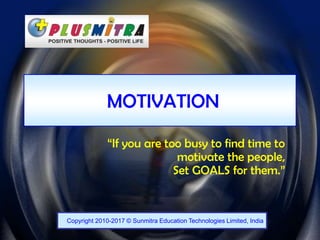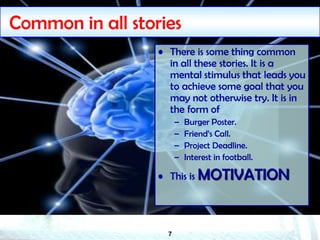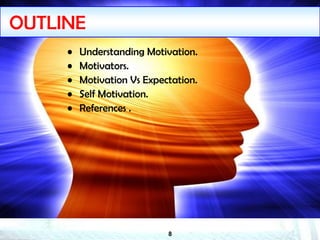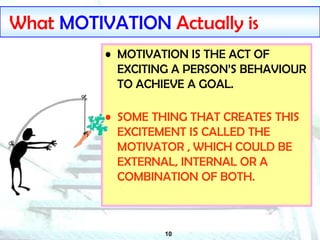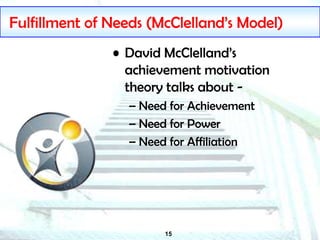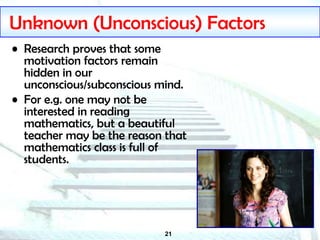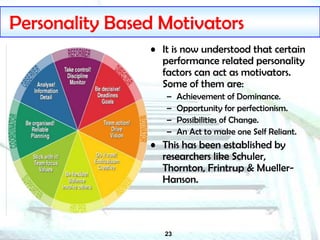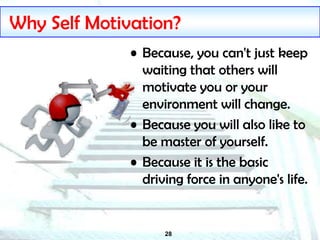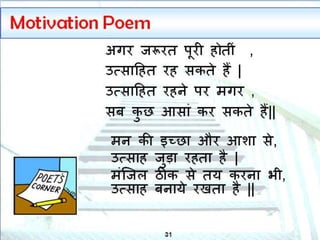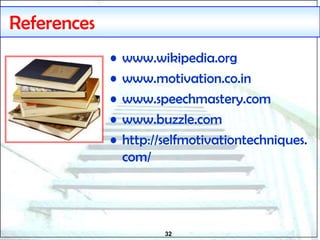Motivation
- 1. 1 MOTIVATION “If you are too busy to find time to motivate the people, Set GOALS for them.” Copyright 2010-2017 © Sunmitra Education Technologies Limited, India
- 2. 2 Yes! It happens this way
- 3. 3 Desire for a Burger You are not hungry. You pass by a burger shop. You see a poster inviting you for a low price burger. Your mouth start salivating. You enter the shop and quickly order one to have it immediately.
- 4. 4 Going for a Movie You are having a busy time at office. A friend calls you and suggests you for a movie in the evening. You readily agree and the same eve you are seen in the cinema hall watching a movie, you would otherwise not prefer to watch.
- 5. 5 Working late at Office You are told a project deadline on which a client is supposed to visit your office and see the demonstration of work you have done. You are sitting late in the office to complete your demo, without demanding any overtime. Just some late evening grub at office is enough for you.
- 6. 6 Getting up early Raju is a late riser. One day his uncle visits his house and he invites Raju to come to the football match in the morning. Next day Raju gets up early even without an alarm. He then wakes up his uncle to get ready to take him to the football match.
- 7. 7 Common in all stories • There is some thing common in all these stories. It is a mental stimulus that leads you to achieve some goal that you may not otherwise try. It is in the form of – Burger Poster. – Friend’s Call. – Project Deadline. – Interest in football. • This is MOTIVATION
- 8. 8 OUTLINE • Understanding Motivation. • Motivators. • Motivation Vs Expectation. • Self Motivation. • References .
- 10. 10 What MOTIVATION Actually is • MOTIVATION IS THE ACT OF EXCITING A PERSON’S BEHAVIOUR TO ACHIEVE A GOAL. • SOME THING THAT CREATES THIS EXCITEMENT IS CALLED THE MOTIVATOR , WHICH COULD BE EXTERNAL, INTERNAL OR A COMBINATION OF BOTH.
- 11. 11 MOTIVATORS .
- 12. 12 PRIMARY MOTIVATORS • Fulfillment of Needs. • Reduction in urge of needs. • Presence of factors that may not motivate, but absence might create de-motivation. • Protection of Interest. • Goal. • Self Determination. • Unknown (Unconscious) Motivators. • Based on Personality Factors. • Based on X-Y approach.
- 13. 13 Fulfillment of Needs (Maslow’s Model) • Needs defined by Maslow. – Physiological (Sleep, Hunger, Thirst etc.) – Safety and security. – Social (Love, Friendship) – Self esteem (Regard for oneself) – Self Actualisation
- 14. 14 Fulfillment of Needs (Alderfer’s Model) • Needs Defined By Alderfer – Existence (Physiological and Safety) – Relatedness (Social) – Growth (Esteem and Actualisation)
- 15. 15 Fulfillment of Needs (McClelland’s Model) • David McClelland’s achievement motivation theory talks about - – Need for Achievement – Need for Power – Need for Affiliation
- 16. 16 Reducing the urge of needs • This is also called satisfying the drive technique. • This is a way of giving something that automatically reduces the urge of a need. • For E.g. when food is eaten at regular intervals the need called Hunger is not faced. Same way one can be motivated in a way that needs are not felt. • Other way to reduce urge is to accept that he is not in need of something. He is then sufficiently motivated to act even without the absence of fulfilment of that need. This is also called COGNITIVE DISSONANCE (identification of internal conflict).
- 17. 17 Absence-Presence effect of motivators • This is a 2 factor method, explained by Herzberg. • One can see that Challenging Work, Recognition, Responsibility might be MAIN MOTIVATORS while .. • Absence of Status, Salary, Job Security might be demotivators. These are called HYGIENE FACTORS in this theory.
- 18. 18 Protection of Interests • Obtaining better results by providing work in the area of Interests is quite obvious. • Techniques such as Holland Codes are available to find interests to make choices related to vocational work areas.
- 19. 19 Goals itself are motivators • Researchers like Douglas Vermeeren have proved that human beings have inherent inclination to reach given milestones. • The desire and possibility of reaching goals is related to – Proximity (how near the goal is) – Difficulty (ease of reaching it) – Specificity (Clarity of definition)
- 20. 20 Self Determination • From inside we have a tendency to grow and keep developing. • With environmental encouragement for autonomy, competency feedback and fulfillment of need of relatedness one can be self-determined to remain motivated. • This is explained as a part of Self Determination Theory (SDT) given by Deci and Ryan.
- 21. 21 Unknown (Unconscious) Factors • Research proves that some motivation factors remain hidden in our unconscious/subconscious mind. • For e.g. one may not be interested in reading mathematics, but a beautiful teacher may be the reason that mathematics class is full of students.
- 22. 22 X-Y Theory Approach • Theory by Douglas McGregor. • X-Theory: People need close supervision as they are basically lazy and they generally dislike work. They only work for money, thus they are the ones who need to be blamed. • Y-Theory: People can exercise their self control. They enjoy work. They want to do well. They can be trusted to become partners in decision making. • Later Z-Theory has been developed that talks about Increasing Loyalty by providing Stability.
- 23. 23 Personality Based Motivators • It is now understood that certain performance related personality factors can act as motivators. Some of them are: – Achievement of Dominance. – Opportunity for perfectionism. – Possibilities of Change. – An Act to make one Self Reliant. • This has been established by researchers like Schuler, Thornton, Frintrup & Mueller- Hanson.
- 24. 24 MOTIVATION Vs EXPECTATION Expectation is the biggest killer of Motivation.
- 25. 25 Why do we expect • Because it is our routine behavioral instinct. • Because we think we have done a lot for others. • Because things change continuously. • Because it is a convenient answer to our own idleness. • Because we have experienced some gains out of past expectations.
- 26. 26 Expectation can be used as motivation • As per theory by Victor Vroom expectation of people can be converted to motivation IF - – More effort is related to better performance rating. – Better Performance Rating is related to Rewards and – Rewards are valued by people concerned.
- 27. 27 SELF MOTIVATION "Build upon the strengths, and the weaknesses will gradually take care of themselves." - Joyce C. Lock
- 28. 28 Why Self Motivation? • Because, you can't just keep waiting that others will motivate you or your environment will change. • Because you will also like to be master of yourself. • Because it is the basic driving force in anyone's life.
- 29. 29 Self Motivation Techniques • Set Target. • Set Milestones. • Reward Yourself on Every Milestone. • Remain focused. Once committed, don't analyse your goal everyday. • Visualise that you are there.
- 30. 30 Self Motivation Can Do wonders. • Can easily get rid of problems related to attitude. • Problems related to communication. • Problems related to habits (Such as smoking, eating oily foods etc.) • Problems related to stress. • Can even help you to get rid of your financial problems.
- 31. 31
- 32. 32 References • www.wikipedia.org • www.motivation.co.in • www.speechmastery.com • www.buzzle.com • http://selfmotivationtechniques. com/
- 33. 33 • Ask and guide me at sunmitraeducation@gmail.com • Share this information with as many people as possible. • Keep visiting www.sunmitra.com for programme updates.
